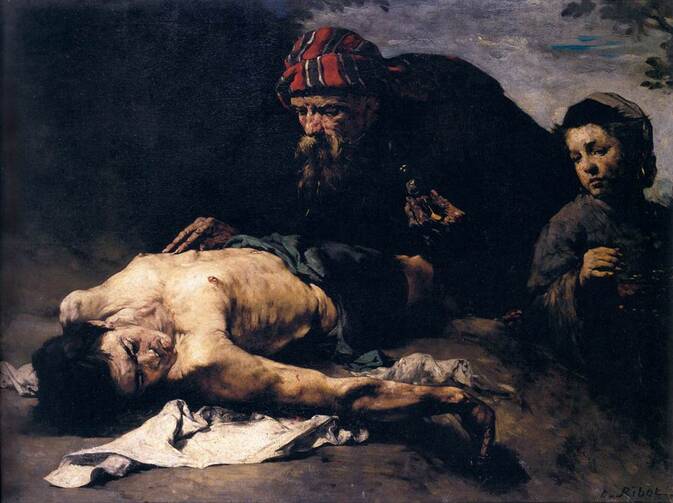One has to wonder if ISIS knows what it is doing. The idea behind domestic terror attacks is to sow dissension by exploiting the prejudices of the West, using fear to pry apart communities. Yet the effect is quite often the opposite.
Consider what happened in the Hernandez home the morning after the shooting at the Nightclub Pulse. In The New York Times Julie Turkewitz reported that
Jesus compels the scholar of the law to see the implications of his Parable of the Good Samaritan, when he asks:
Pain transcends politics and prejudice. It calls out to us, above the division of doctrines. “Sabes que te quiero mucho?Que tú eres el amor de mi vida?”
The German philosopher Robert Spaemann wrote that pain refuses to be categorized, yet it demands recognition.
The same categories that allow pain to be grasped as an irreducible reality resists its transposition into the terms of modern—i.e. scientific thinking. The communion of those who suffer is, like the communion sanctorum, indifferent to classification into historical periods (16).
Philosophers can debate what is real, what is capable of proof, but people know pain. Christ’s parable—and modern politics—show that it is possible to seal away sympathy for the suffering, yet one can only do so only by smothering something deep within the soul.
Suffering creates communion. The New Testament names those who suffer as “saints,” and the martyrs were the first to be recognized as such. To be human is to respond to the pain of others, to recognize our own humanity in their tortured bodies and faces. No law writes our response. It’s scripted in the soul.
This past June, The New York Times reported that now “L.G.B.T. people are twice as likely to be targeted as African-Americans, and the rate of hate crimes against them has surpassed that of crimes against Jews.” It's a lamentable, costly grace, but pain has a way of easing prejudice. Suffering creates communion.
Before San Bernardino, weren’t most Americans (at least a little) jealous of Californians? Before Paris, didn’t we like to joke that the French were not the allies that we would have chosen? Yet prejudice abates in the face of pain. Would civil rights have advanced in America—and in other parts of the world—without images of passion, broadcast into our homes? Of course, the sufferings of Freedom Riders didn’t end racism in America, just as the Holocaust hasn’t eradicated anti-Semitism. Yet suffering creates solidarity. It sews together souls.
One has to wonder if ISIS knows what it is about. Kill yourselves in the name of an ideology and we pity you. Kill others, and we ignore you. We see only the misery of your victims. , because the only way not to be a Good Samaritan, not to respond to suffering, is to deny something deeply human within ourselves.
Deuteronomy 30: 10-14 Colossians 1: 15-20 Luke 10: 25-37








